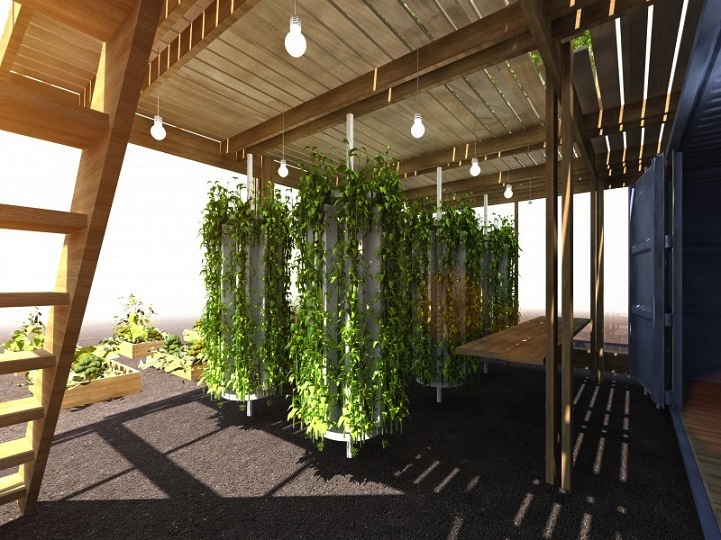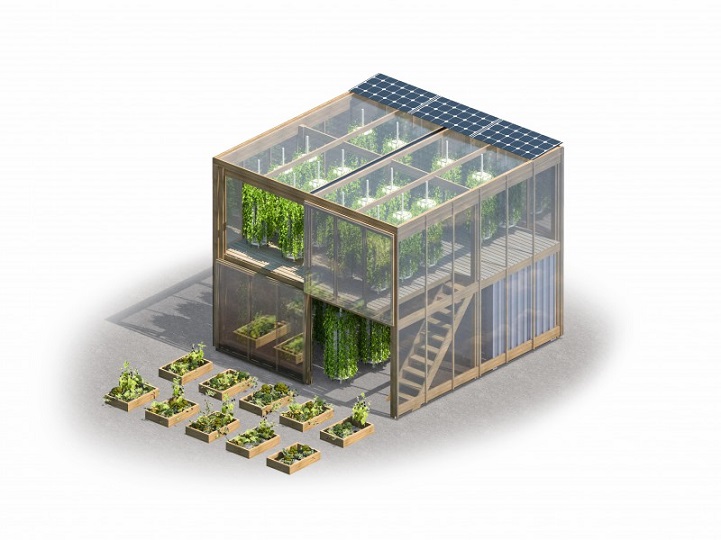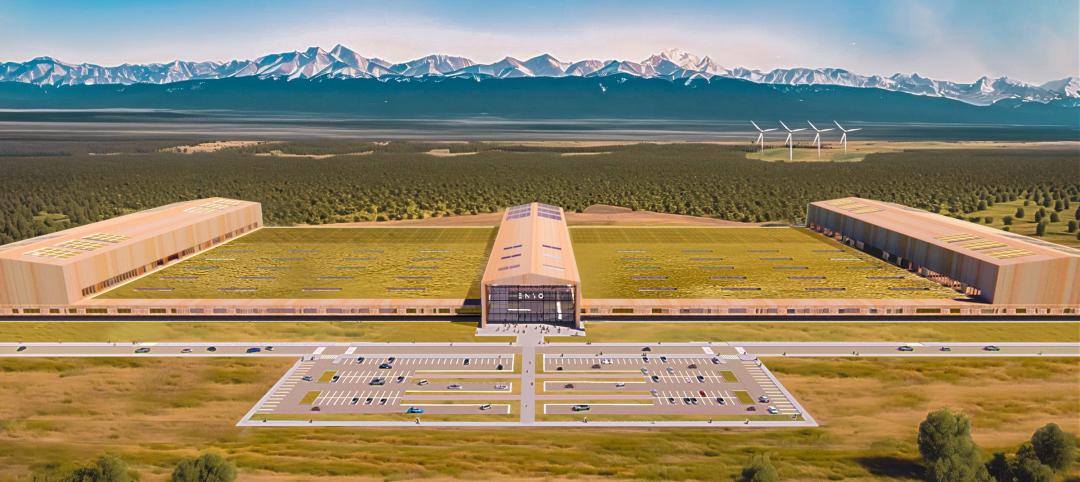Human Habitat, a Copenhagen-based urban design lab, thinks it has solved one of the problems nagging urban food production—limited space—with its Impact Farm, an easy-to-transport and -assemble hydroponic grown garden that’s designed to help rescue urban communities from their fresh-produce scarcities.
“We wanted to make urban farming even smarter,” Ronnie Markussen, one of Human Habitat’s founders, told Collectively.org, a website that reports on new ideas for the urban environment. The goal, he went on, is to increase food security in cities, lower the ecological footprint of food production, create jobs, and easily adapt to changes in the urban landscape.
“We wanted to reconnect people to food by giving them a green space that brings nature back into our cities,” said Human Habitat’s cofounder Mikkel Kjaer.
All of the construction components for Impact Farm, along with an instruction booklet, are stored and shipped in a flatpack container. When unpacked, the container includes an assembly kit of pre-made materials that become a two-story vertical, soil-free, hydroponic farm that covers 538 sf.
Construction takes about 10 days. And the structure can just as easily be disassembled and moved to another location. “The foundation of our design is C2C [cradle-to-cradle] and the circular economy,” the company states. “We use materials that are either re-used or designed to circulate within the production circle.” The whole structure is designed to be self-sufficient in terms of water, heat and electricity by harvesting sun and wind, and collecting rainwater. Future farms may adopt aquaponics.
Impact Farm is designed to create an economically sustainable business model that ensures resource-efficient local food production, green jobs, and increased local economic activity. The facility can grow greens, vegetables, herbs, and fruiting plants within its frame.

Currently, a prototype is being tested in Copenhagen’s Norrebro neighborhood, and Human Habitat’s Kjaer and Markussen intend to offer their product for sale to large cities in the United States and other parts of the world.
Circulate News and Collectively.org report that the innovators envision a number of different buyers of the farm, including housing co-ops, restaurants, schools, and municipalities.
Kjaer and Markussen estimate that the Impact Farm—which is meant to be a temporary structure—could produce 3-6 tons of food per year commercially, depending on crop combinations. The founders told Collectively.org that a larger, community-driven project—such as one seeking to produce vegetables, leafy greens and fruit for distribution to schools, kindergartens and nursing homes—could expect to produce up to just over 6 tons per year.
Initial retail costs are still being estimated.
Related Stories
Sustainable Design and Construction | Oct 10, 2024
Northglenn, a Denver suburb, opens a net zero, all-electric city hall with a mass timber structure
Northglenn, Colo., a Denver suburb, has opened the new Northglenn City Hall—a net zero, fully electric building with a mass timber structure. The 32,600-sf, $33.7 million building houses 60 city staffers. Designed by Anderson Mason Dale Architects, Northglenn City Hall is set to become the first municipal building in Colorado, and one of the first in the country, to achieve the Core certification: a green building rating system overseen by the International Living Future Institute.
Office Buildings | Sep 6, 2024
Fact sheet outlines benefits, challenges of thermal energy storage for commercial buildings
A U.S. Dept. of Energy document discusses the benefits and challenges of thermal energy storage for commercial buildings. The document explains how the various types of thermal energy storage technologies work, where their installation is most beneficial, and some practical considerations around installations.
Industrial Facilities | Aug 28, 2024
UK-based tire company plans to build the first carbon-neutral tire factory in the U.S.
ENSO, a U.K.-based company that makes tires for electric vehicles, has announced plans to build the first carbon-neutral tire factory in the U.S. The $500 million ENSO technology campus will be powered entirely by renewable energy. The first-of-its-kind tire factory aims to be carbon neutral without purchased offsets, using carbon-neutral raw materials and building materials.
Government Buildings | Aug 19, 2024
GSA posts new RFI for enabling energy efficiency, decarbonization in commercial buildings
The U.S. General Services Administration (GSA), in collaboration with the U.S. Department of Energy, recently released a new Request For Information (RFI) focused on enabling energy efficiency and decarbonization in commercial buildings. GSA wants to test innovative technologies through GSA’s Center for Emerging Building Technologies.
Adaptive Reuse | Aug 14, 2024
KPF unveils design for repositioning of Norman Foster’s 8 Canada Square tower in London
8 Canada Square, a Norman Foster-designed office building that’s currently the global headquarters of HSBC Holdings, will have large sections of its façade removed to create landscaped terraces. The project, designed by KPF, will be the world’s largest transformation of an office tower into a sustainable mixed-use building.
Sustainability | Aug 14, 2024
World’s first TRUE Zero Waste for Construction-certified public project delivered in Calif.
The Contra Costa County Administration Building in Martinez, Calif., is the world’s first public project to achieve the zero-waste-focused TRUE Gold certification for construction. The TRUE Certification for Construction program, administered by Green Business Certification Inc. (GBCI), recognizes projects that achieve exceptional levels of waste reduction, reuse, and recycling.
Energy Efficiency | Aug 9, 2024
Artificial intelligence could help reduce energy consumption by as much as 40% by 2050
Artificial intelligence could help U.S. buildings to significantly reduce energy consumption and carbon emissions, according to a paper by researchers at the Lawrence Berkeley National Laboratory.
Green | Aug 7, 2024
Major cities worldwide set building performance standards
Cities around the world are setting building performance standards (BPS) as a key measure to cut emissions and meet climate targets, according to a report from JLL.
Smart Buildings | Jul 25, 2024
A Swiss startup devises an intelligent photovoltaic façade that tracks and moves with the sun
Zurich Soft Robotics says Solskin can reduce building energy consumption by up to 80% while producing up to 40% more electricity than comparable façade systems.
Sustainability | Jul 18, 2024
Grimshaw launches free online tool to help accelerate decarbonization of buildings
Minoro, an online platform to help accelerate the decarbonization of buildings, was recently launched by architecture firm Grimshaw, in collaboration with more than 20 supporting organizations including World Business Council for Sustainable Development (WBCSD), RIBA, Architecture 2030, the World Green Building Council (WorldGBC) and several national Green Building Councils from across the globe.

















